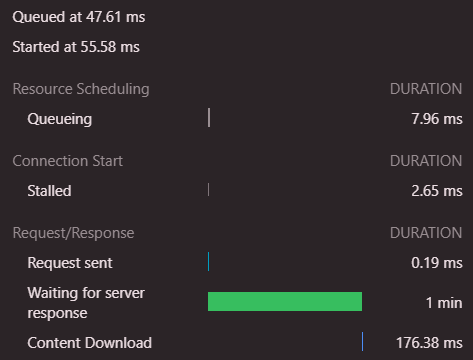I am self-hosting a fresh installation of the pre-compiled Vikunja v0.24.6 binary via nginx and PostgreSQL on Ubuntu 22.04. All features seem to be working as expected, with the one notable exception that seemingly random actions result in a precisely 60-second delay.
The Network tab of the browser’s DevTools shows that certain requests have status (pending) during this delay, but they do eventually resolve and the API call is successfully completed or the .css/.js/etc file is downloaded.
When configuring Vikunja for aggressive logging, these delays are marked by an absence of new lines generated in journalctl, followed by a sudden wave of new lines after the 60-second period has passed. All of those sudden logs show response times well within the expected 20-100ms baseline demonstrated at https://try.vikunja.io/.
There do not appear to be any errors or reports of timed out requests in journalctl, and the PostgreSQL logs show a similar pattern of silence followed by a sudden wave of instantly-resolved transaction requests.
I tried matching versions with https://try.vikunja.io/ (v0.24.1) without success. I tried installing the Debian package instead of the zipped binary without success. I checked htop and found both processors and memory well below capacity. I tested other services running on the same server and found no similar delays.
nginx Config
server {
server_name vikunja.example.org;
location / {
proxy_pass http://localhost:3456;
client_max_body_size 50M;
}
listen 443 ssl; # managed by Certbot
ssl_certificate /etc/letsencrypt/live/vikunja.example.org/fullchain.pem; # managed by Certbot
ssl_certificate_key /etc/letsencrypt/live/vikunja.example.org/privkey.pem; # managed by Certbot
include /etc/letsencrypt/options-ssl-nginx.conf; # managed by Certbot
ssl_dhparam /etc/letsencrypt/ssl-dhparams.pem; # managed by Certbot
}
server {
if ($host = vikunja.example.org) {
return 301 https://$host$request_uri;
} # managed by Certbot
listen 80;
server_name vikunja.example.org;
return 404; # managed by Certbot
}
Vikunja Config
service:
JWTSecret: "rAnDoM_sTrInG"
jwtttl: 259200
jwtttllong: 2592000
interface: ":3456"
unixsocket:
unixsocketmode:
publicurl: "vikunja.example.org"
rootpath: /opt/vikunja
maxitemsperpage: 50
enablecaldav: true
motd: ""
enablelinksharing: true
enableregistration: false
enabletaskattachments: true
timezone: America/Los_Angeles
enabletaskcomments: true
enabletotp: true
testingtoken: ''
enableemailreminders: true
enableuserdeletion: true
maxavatarsize: 1024
demomode: false
allowiconchanges: true
customlogourl: ''
enablepublicteams: true
sentry:
enabled: false
dsn: "https://440eedc957d545a795c17bbaf477497c@o1047380.ingest.sentry.io/4504254983634944"
frontendenabled: false
frontenddsn: "https://85694a2d757547cbbc90cd4b55c5a18d@o1047380.ingest.sentry.io/6024480"
database:
type: "postgres"
user: "vikunja"
password: "postgres_password"
host: "localhost"
database: "vikunja"
path: "./vikunja.db"
maxopenconnections: 100
maxidleconnections: 50
maxconnectionlifetime: 10000
sslmode: disable
sslcert: ""
sslkey: ""
sslrootcert: ""
tls: false
typesense:
enabled: false
url: ''
apikey: ''
redis:
enabled: false
host: 'localhost:6379'
password: ''
db: 0
cors:
enable: false
origins:
- "*"
maxage: 0
mailer:
enabled: false
host: ""
port: 587
authtype: "plain"
username: "user"
password: ""
skiptlsverify: false
fromemail: "mail@vikunja"
queuelength: 100
queuetimeout: 30
forcessl: false
log:
path: /var/log/vikunja
enabled: true
standard: "stdout"
level: "INFO"
database: "off"
databaselevel: "INFO"
http: "off"
echo: "off"
events: "off"
eventslevel: "INFO"
mail: "off"
maillevel: "INFO"
ratelimit:
enabled: false
kind: user
period: 60
limit: 100
store: keyvalue
noauthlimit: 10
files:
basepath: /media/storage/vikunja # relative to the binary
maxsize: 50MB
migration:
todoist:
enable: false
clientid:
clientsecret:
redirecturl: <service.publicurl>/migrate/todoist
trello:
enable: false
key:
redirecturl: <frontend url>/migrate/trello
microsofttodo:
enable: false
clientid:
clientsecret:
redirecturl: <frontend url>/migrate/microsoft-todo
avatar:
gravatarexpiration: 3600
backgrounds:
enabled: true
providers:
upload:
enabled: true
unsplash:
enabled: false
accesstoken:
applicationid:
legal:
imprinturl:
privacyurl:
keyvalue:
type: "memory"
auth:
local:
enabled: true
openid:
enabled: false
providers:
- name:
authurl:
logouturl:
clientid:
clientsecret:
scope: openid email profile
metrics:
enabled: false
username:
password:
defaultsettings:
avatar_provider: initials
avatar_file_id: 0
email_reminders_enabled: false
discoverable_by_name: false
discoverable_by_email: false
overdue_tasks_reminders_enabled: true
overdue_tasks_reminders_time: 9:00
default_project_id: 0
week_start: 0
language: en
timezone: America/Los_Angeles
webhooks:
enabled: true
timeoutseconds: 30
proxyurl:
proxypassword:
It seems fairly clear that there is something wrong with my configuration, but I am ill-equipped to identify what. Any advice you might offer to help troubleshoot this problem would be greatly appreciated.
Update:
I took a look at bypassing nginx to see if the issue persisted. I opened Vikunja’s port and connected directly to the server, changing the frontend’s API target similarly. The issue was resolved, so I took a look into setting up a minimal nginx config as described in the documentation. This did not resolve the issue, so next I tried using the nginx upstream module instead.
upstream vikunja {
server localhost:3456;
}
server {
server_name vikunja.example.org;
location / {
proxy_pass http://vikunja;
...
Unfortunately, this was not adequate to work around this unexpected behavior. Making use of a reverse proxy at all seems to interfere in a way I do not quite understand.
